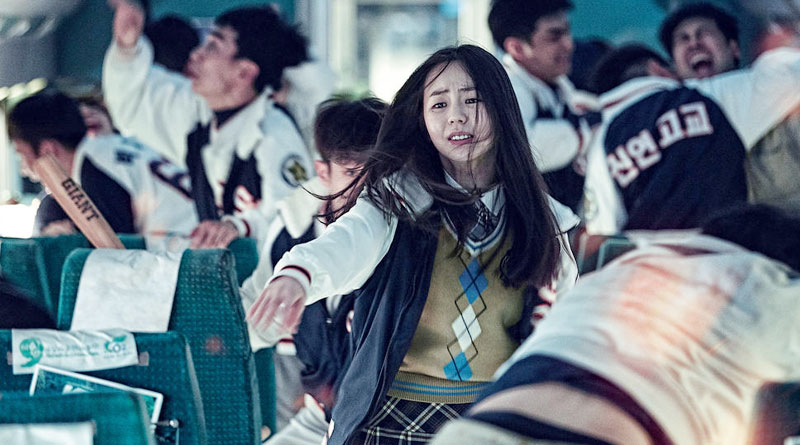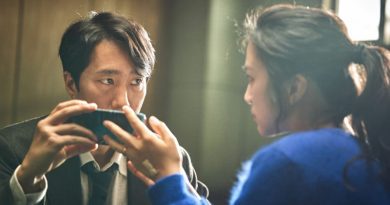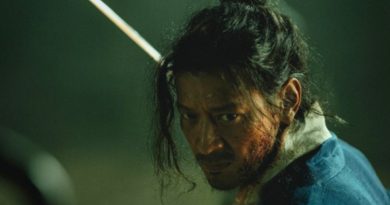Train to Busan 부산행 (2016) Review
When a sudden viral outbreak that spread across South Korea which also includes the Seoul-based bullet train departing to Busan, a group of passengers are forced to fight for their survivals against a horde of zombies. Among them are the workaholic fund manager Seok-woo (Gong Yoo) alongside his estranged daughter Su-an (Kim Su-An), the well-built father-to-be Sang-hwa (Ma Dong-Seok) and his heavily-pregnant wife Seong-kyeong (Jung Yu-Mi), as well as two teenage couple Young-guk (Choi Woo-Shik) and Jin-hee (Ahn So-Hee).
First premiered in Cannes before subsequently rolling out across Asian cinemas to overwhelming responses, it’s easy to see why Train to Busan has been receiving strong word-of-mouth. Making his live-action debut, indie animation director Yeon Sang-Ho’s (The King of Pigs, The Fake) successfully combines the best of both worlds by meshing the popular horror element of zombie subgenre and sociopolitical allegory of corporate greed and selfishness.
As the first homegrown zombie movie ever made in the South Korean cinema, Sang-Ho understands the genre well enough like a seasoned pro. The makeup effect of the flesh-eating zombies as well as how the undead contorting and moved their bodies are top-notch. The amount of gore and violence may have been subdued by genre standard, but Sang-Ho alongside cinematographer Lee Hyung-Deok manages to compensate them with the way they filmed the zombies. At one point, they even creatively shoot the fast-moving zombies from the bird’s-eye view as the undead pile against each other and drag themselves along the railway track while trying to board the train. Also worth noting here is their technical approach of eschewing the shaky-cam technique seen in many zombie movies these days in favour of a clean and crisp shooting style.
Thanks to Sang-Ho’s subtle animation background, he certainly has an eye for details when comes to staging a number of thrilling set-pieces in and out of the train. There are plenty of notable moments worth mentioning here, which includes an elaborate scene set in a seemingly deserted station and another scene where the three survivors (Seok-woo, Sang-hwa and Young-guk) fight their ways through the zombies across several train carriages with makeshift weapons. Speaking of this scene alone, it’s a refreshing visual sight to see one of the characters use plain bare fists for a change to take down a group of zombies.

Apart from Sang-Ho’s technical know-how direction, Train to Busan also benefits from Park Joo-Suk’s engaging screenplay. The central “zombies-on-the-train” premise alone is a nice touch of novelty while the story’s aforementioned sociopolitical context hits home the most. The way the characters within the confines of a train are defined through class divides — as in first-class and economy-class ticket holders — immediately strikes a chord to Boon Joon-Ho’s Snowpiercer. The first class, especially the ruthless middle-aged businessman Yong-guk (Kim Eui-Sung, perfectly cast), portrayed as the most repellent character in this movie. He only cares about himself and even willing to sacrifice others for his own benefit, which in this case, survival. The passengers from the economy class, in the meantime, are varied from Seok-woo’s selfish fund manager to Sang-hwa’s honest and compassionate father-to-be.
As the lead protagonist of the movie, Gong Yoo’s character is easily relatable. In the beginning, he is depicted as a man who cares more about his work than his own family. He even pays little attention to his daughter’s birthday and hesitates when his daughter wants him to bring her to Busan to meet her mother, which also happens to be Seok-woo’s ex-wife. But as cold and indifferent as a father he tends to be, his character gradually evolves to a caring person who finally admits his mistakes and redeems himself by doing the right thing. Such character like Seok-woo may have been a dime a dozen, but Gong Yoo’s layered performance is touching enough to make us care. Ma Dong-Seok steals the show with his effective mix of hilarious and on-the-nose performance as Sang-hwa. The rest of the supporting cast is just as competent, even for a minor role of the train driver is also efficiently portrayed.
But Train to Busan is far from a perfect zombie movie. The movie tends to be overly melodramatic, especially during some of the emotional scenes. The CGI can be spotty at times, such as the use for a larger set-piece seen during the collision of a burning train. Then there is the opening drama that focuses on the estranged relationship between Seok-woo and Su-an, which in turn, feels plodding and taking the time to pick up the pace.
Still, for all the shortcomings, Train to Busan succeeds as a well-crafted zombie movie that thrills and engages the viewers with a relevant topical issue and universal theme of human nature.





